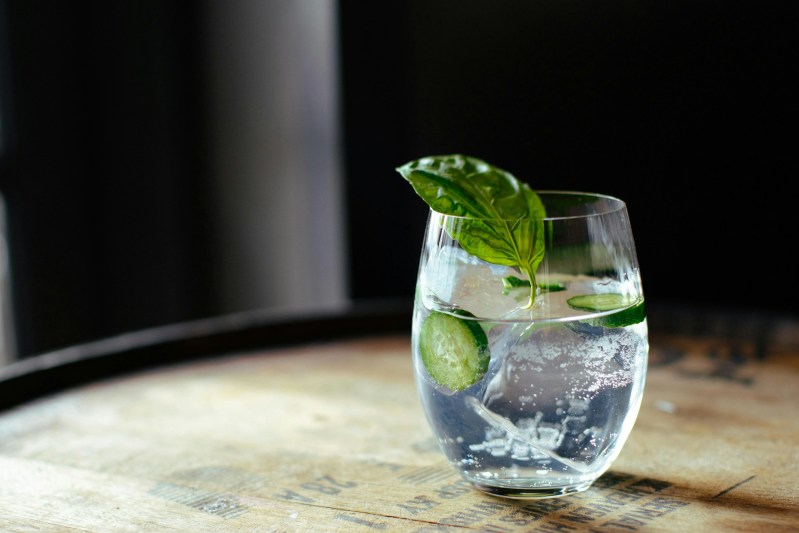
If you’re new to spirits and you just took a look at a glass of vodka and a glass of gin, you’d have a hard time differentiating the difference between gin and vodka. Both spirits begin their lives the same way. Both vodka and gin start at neutral spirits. After it’s distilled, vodka is a crystal-clear spirit that’s crafted to have as little aroma and flavor as possible. The same can’t be said for gin.
Like vodka, gin is a distilled neutral spirit. Both can be made from a variety of ingredients. Gins are typically made from barley, wheat, and other grains, while vodka is often made from potatoes, corn, wheat, rye, and other ingredients. Right after distillation, there isn’t much difference between the two. This is why we’re going to take a deep dive into gin vs vodka.
What makes a gin?

What is gin, and how is it made? As we mentioned before, gin is made by distilling a neutral grain alcohol (just like vodka). This is where it deviates from the other spirit. Instead of being distilled multiple times and filtered to remove impurities and flavor, gin undergoes a transformation that gives it flavor.
Using different techniques depending on the distiller and style of gin, the neutral spirit is then infused with a variety of ingredients. First and foremost is the juniper berry. This is the ingredient that gives gin its fragrant pine needle aroma and flavor. After that, the rest of the ingredients are up to the distiller. They can use any herbs, spices, botanicals, fruits, nuts, or other ingredients they see fit. Popular ingredients include Angelica root, orris root, licorice, orange peels, almonds, coriander, and cardamom.
What does gin taste like?

Gin is one of the most versatile and adaptable spirits. After it’s distilled, the ingredients he or she uses to infuse the spirit are purely up to them. Besides juniper berries, there are no set rules for what may or may not be included in a gin’s flavor profile. For example, on top of the usual ingredients, Gray Whale Gin gets some of its flavor from the addition of sea kelp. If you want to get simpler with it, Hendrick’s popular flavor comes from the addition of cucumber and rose.
While we established that if you took a bunch of gins and unthinkingly sampled them side by side, they might have remarkably different aromas and flavors, there are general flavors you can expect from a well-made, balanced gin. There will be pine from the juniper, likely citrus, floral flavors, and generally a bit of spice.
What makes a vodka?

What is vodka? Without the addition of juniper and other herbs and botanicals, gin is simply not gin. In the simplest terms, it’s vodka. Vodka, as we briefly touched upon earlier, is a distilled spirit made mostly of ethanol and water. It sometimes contains impurities and flavors from the base ingredients (potatoes, corn, wheat, rye, grapes, or something else). There are a variety of ways distillers remove these flavors and impurities.
First, they will distill the spirit several times. You might see bottles that say that a very smooth vodka was distilled five or more times. Secondly, distillers might add water to the distilled spirit. Often, right after distillation, the alcohol content is far too high (as most vodkas are 80-proof). Lastly, they remove impurities and flavors, and to simply smooth out the vodka, distillers will filter it through charcoal and other things. The folks at Iceland’s Reyka Vodka even filter their vodka through volcanic rocks.
What does vodka taste like?

It’s too simplistic and close-minded to say that vodka doesn’t taste like anything. This just isn’t true. Sure, distillers aim to remove as much flavor as possible as impurities. But, while your favorite vodka might be creamy, smooth, and have minimal flavor, there are still some flavors and aromas there.
If it’s a potato-based vodka, it’s going to have some creaminess to it; a corn-based vodka is invariably going to be sweeter, a wheat-based vodka will be softer on the palate, and a rye-based vodka will likely have a hint of cracked black pepper spice to it. None are overpowering, though, but they are all there.
Next time you crack open a bottle of your go-to vodka, instead of simply mixing it into a Martini or another cocktail, take a moment to nose it and take a sip. You’ll be surprised by the aromas and flavors you find.
Why vodka doesn’t taste like gin

In the most basic sense, when first distilled, vodka does taste like gin. It’s just that the addition of juniper berries and other herbs and botanicals changes the flavor so drastically that the two spirits don’t even remotely resemble each other. It’s also literally the only thing that separates the two spirits.
Editors' Recommendations
- Mezcal vs. tequila: What’s the difference?
- What is orange wine? This trendy wine has a long history
- Wolves Whiskey, Undefeated’s new collab has an American Single Malt not to be missed
- This is how one man turned Mountain Dew into wine
- Our favorite bourbon cocktails for summer (it’s not just a cold-weather drink)



